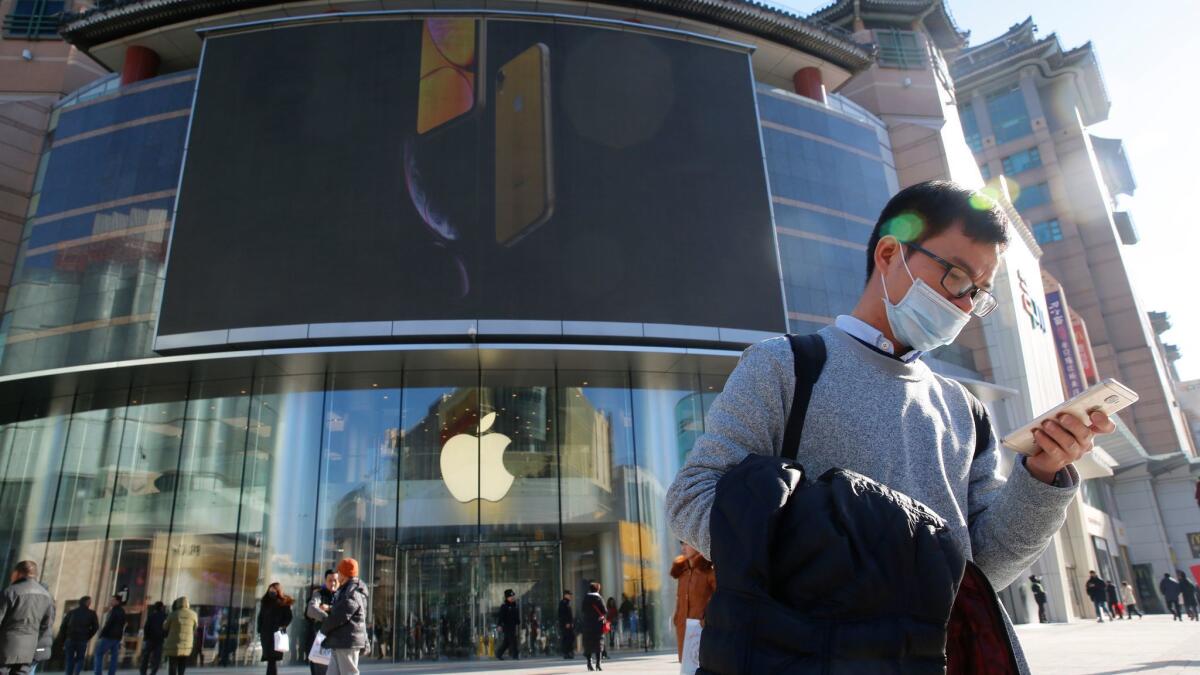Apple cuts revenue forecast, citing ‘deterioration’ in China

Apple Inc. announced Wednesday that it would miss its revenue estimate for the quarter that included the holiday season — a rare misfire that the company blamed on unexpected challenges in the Chinese economy and the trade war between the United States and China.
Months after unveiling two new iPhones, Apple Chief Executive Tim Cook said in a note to investors that the company had lowered its revenue guidance for its fiscal first quarter — which ended Dec. 29 — to $84 billion, down from its previous estimate of between $89 billion and $93 billion. The announcement, made after the close of markets, sent Apple’s stock plunging more than 7% in after-hours trading.
In explaining the change, Cook said in his note that Apple “did not foresee the magnitude of the economic deterioration” in markets including greater China. He said most of the revenue shortfall to the company’s initial guidance “occurred in greater China across iPhone, Mac and iPad.”
Along with slowed growth there in the second half of last year, Cook said that the “economic environment in China has been further impacted by rising trade tensions with the United States.”
“As the climate of mounting uncertainty weighed on financial markets, the effects appeared to reach consumers as well, with traffic to our retail stores and our channel partners in China declining as the quarter progressed,” Cook said.
Shares of Apple have fallen 32% from an October peak amid growing concerns about the iPhone — by far Apple’s most important product line, comprising more than 60% of the company’s 2018 revenue.
Although China and other emerging markets accounted for the vast majority of year-over-year iPhone revenue decline, in some developed markets, iPhone upgrades also weren’t as strong as the company anticipated, Cook said.
In November, the company said it would stop reporting unit sales of iPhones, iPads and Macs beginning in fiscal 2019. That sparked concern that Apple wanted to avoid disclosing weak growth numbers. But the move also highlighted the company’s desire to become more of a services business. In the letter Wednesday, Cook said Apple generated $10.8 billion in services revenue during the quarter. That would be a 27% increase from a year earlier.
Apple’s announcement is likely to add further volatility to the stock market, where U.S. technology stocks have helped drive a major correction in recent months. It also comes as the Trump administration and the Chinese are trying — without success, so far — to resolve a trade war in which the two countries have put tariffs on hundreds of billions of dollars’ each other’s goods.
While economists have suspected that the Chinese economy has been slowing, it has not been clear how much that might translate into a decline in global economic growth that would hit the United States. The Apple earnings miss suggests that the effects of the China slowdown could be reaching U.S. shores fairly quickly.
The earnings miss also shows how the trade war is enveloping one of the biggest U.S. brands, which had worked hard to get its product exempted from tariff lists released by the Trump administration.
Investors will probably be wondering Thursday whether Apple’s news is a preview of what other technology, retail, auto and manufacturing companies are facing.
Trump has put tariffs on nearly half the goods China sells to the United States and has threatened to place hefty tariffs on all Chinese products coming into the country — including iPhones, which are currently excluded from the additional taxes — if China’s president doesn’t make a deal Trump likes by early March.
Romm writes for the Washington Post. Bloomberg was used in compiling this report.
More to Read
Inside the business of entertainment
The Wide Shot brings you news, analysis and insights on everything from streaming wars to production — and what it all means for the future.
You may occasionally receive promotional content from the Los Angeles Times.










